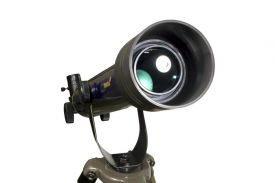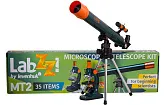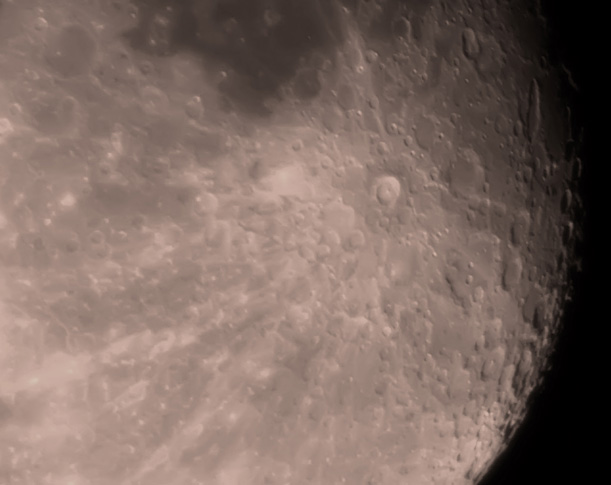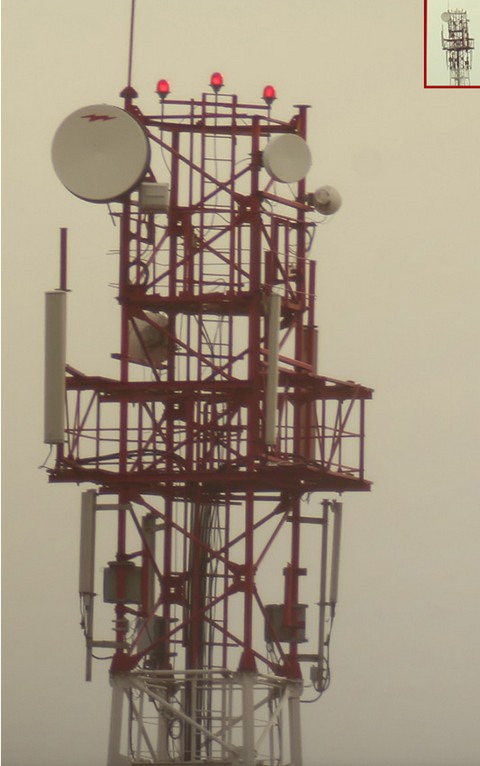A Levenhuk Strike NG teleszkópok áttekintése (angol nyelven)
The endless night sky has always fascinated mankind. Even though you cannot see much with a naked eye, the sight of a myriad stars scattered across the dark expanse of the universe is truly captivating. Sooner or later, all those enthralled with the mysteries of the cosmos are sure to realize that a telescope is essential if they truly want to delve into these mysteries. Indeed, even the simplest model will let you observe the lunar surface, satellites of Jupiter and rings of Saturn, star clusters and some deep-sky objects.
Choosing the first telescope

A beginning stargazer will surely be baffled by the plethora of various telescopes available these days. To be honest, no telescope can be a jack of all trades. Still, stargazers the world over agree that the first telescope should be a compact refractor with a simple altazimuth mount. Such instruments are very reliable and easy to use, they do not require any special maintenance or calibration, and may be used for both celestial and terrestrial observations. Levenhuk Strike NG series includes three models that provide everything an amateur stargazer needs: Levenhuk Strike 50 NG, Levenhuk Strike 60 NG and Levenhuk Strike 80 NG with objective lenses of 50 mm, 60 mm and 80 mm, respectively.
Levenhuk Strike NG series for beginning stargazers
This series is designed and created by Levenhuk for beginning stargazers who are just starting to learn and uncover the various mysteries of the universe. The kit includes everything you will ever need for your first observations: all telescopes come in a colorful box that includes the instrument itself, two eyepieces, a Barlow lens, a compass, a planisphere, a CD with Stellarium software, and a copy of "See it all!", a handbook for amateur stargazers.
Main features of these telescopes
Levenhuk Strike NG telescopes are made to the highest quality standard, and, with proper care, will serve you well for many years to come. Their objective lenses are made of high-quality, fully multi-coated glass. The advanced Levenhuk Strike 80 NG weighs about 11 pounds, the other two models are even lighter – this means that you can easily transport your telescope to the countryside for stargazing. These instruments may even be used during the day for terrestrial observations. Keep in mind, however, that you will need a star diagonal to see proper upright images.
All the Levenhuk Strike NG models are equipped with a finder that allows you to easily navigate the night sky and quickly point the telescope at the desired object. Simply attach the optical tube to the mount, place all the accessories that you will be using on the practical accessory tray, check the planisphere for the most interesting celestial objects that are visible that night, and you're ready for observations!
Levenhuk Strike 50 NG and 60 NG telescopes

Let’s take a closer look at the telescopes. Levenhuk Strike 50 NG and Levenhuk Strike 60 NG are the two basic models of the series with objective lenses of 50 mm and 60 mm, respectively. They are compact and lightweight, but not very powerful. You see, the most important parameter of a telescope is not its practical power, but its objective lens diameter. The larger the diameter, the more you will be able to see through your telescope. These models are perfect for stargazers who are looking for the most compact instrument. Indeed, these telescopes are very lightweight and will easily fit in the trunk of your car.
Binary stars, as seen with Levenhuk Strike NG telescopes
The picture below illustrates capabilities of these telescopes. The white rectangle shows the same binary star, as seen with 80 NG, 60 NG and 50 NG (left to right).
Levenhuk Strike 80 NG

Levenhuk Strike 80 NG, with its high-quality 80-mm objective lens, is the most advanced model of this series. The 1.25" focuser allows you to easily purchase additional eyepieces for your equipment, if you choose to do so. You can even attach a digital camera to the telescope for direct focus photography. You won't be able to capture stunning views of deep-sky nebulae, but interesting images of the lunar surface and terrestrial objects are well within your reach.
That's why we'd recommend opting for the advanced model. Even though it's slightly heavier, its capabilities are greater than the other telescopes of the series. You may refer to the spreadsheet in the end of this article for a list of specifications of each model.
The Moon and a cell tower, as seen with Levenhuk Strike 80 NG
Any of the telescopes will be a wonderful gift for children and adults alike. These instruments are reliable and extremely easy to use, which makes them the perfect choice for your first telescope. Once you learn the ropes, and decide to purchase a more advanced instrument, you will already know what to expect from a telescope.
Capabilities of Levenhuk Strike NG telescopes
| Model | Телескоп Levenhuk Strike 50 NG | (EN) Levenhuk Strike 60 NG Telescope | Телескоп Levenhuk Strike 80 NG | |
| Optical tube material | Metal | Metal | Metal | |
| Lens coating | Fully multi-coated | Fully multi-coated | Fully multi-coated | |
| Objective lens frame material | Plastic | Plastic | Plastic | |
| Dust cap and dew cap | Yes | Yes | Yes | |
| Barrel diameter | 0.96" | 0.96" | 1.25" | |
| Collapsed tripod dimensions (base diameter and height) | 4.7" x 25.6" | 4.7" x 29.9" | 4.7" x 29.9" | |
| Tripod weight | 2.6 lbs | 3.7 lbs | 4.4 lbs | |
| Accessory tray | n/a | n/a | Yes | |
| Optical tube dimensions (diameter and length) | 3.6" x 24" | 3.6" x 28.7" | 4.6" x 28" | |
| Total tube and mount weight | 2.2 lbs | 3.1 lbs | 4 lbs | |
| Total telescope and accessory weight | 5.5 lbs | 7.5 lbs | 9.7 lbs | |
| Telescope mount | Altazimuth Yoke |
Altazimuth Yoke with declination axis |
Altazimuth Yoke with declination axis |
|
| Finderscope | Optical, 3x20 | Red dot, 3x20 | Red dot, 3x20 | |
| Eyepieces in the kit |
F20 mm and F6 mm eyepieces, 3x Barlow lens, diagonal mirror |
F20 mm and F6 mm eyepieces, 3x Barlow lens, diagonal mirror |
F20 mm and F6 mm eyepieces, 3x Barlow lens, diagonal mirror |
|
| Objective lens type | Achromatic | Achromatic | Achromatic | |
| Objective lens diameter | 50 mm | 60 mm | 80 mm | |
| Focal length | 600 mm | 700 mm | 720 mm | |
| Resolution threshold, arcseconds | 2.8 | 2.5 | 1.6 | |
| Limiting stellar magnitude | 10.6 | 10.2 | 11.5 | |
| Lowest practical power (standard accessories) | 30x | 35x | 36x | |
| Highest practical power (standard accessories) | 200x | 233x | 360x | |
| Observations |
Lunar craters, as small as 9 km in diameter, phases of Venus, rings of Saturn, four moons of Jupiter, solar spots (with a special solar filter only!). Bright objects of Messier catalogue |
Lunar craters, as small as 8 km in diameter, phases of Venus, rings of Saturn, four moons of Jupiter and its cloud bands, solar spots (with a special solar filter only!). Bright objects of Messier catalogue, Uranus and Neptune as stars |
Lunar craters, as small as 5 km in diameter, phases of Mercury and Venus, solar spot structure (with a special solar filter only!), Cassini Division in the rings of Saturn, cloud bands of Jupiter, the Great Red Spot and shadows of the planet's satellites on the surface. All objects of Messier catalogue, brightest objects of NGC catalogue |
Any reproduction of the material for public publication in any information medium and in any format is prohibited. You can refer to this article with active link to hu.levenhuk.com.
The manufacturer reserves the right to make changes to the pricing, product range and specifications or discontinue products without prior notice.







